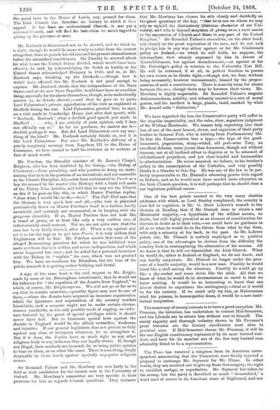One of the best points mooted in the very many
election addresses with which, as Lord Stanley complained, the country is now fed to repletion, is Mr. G-. Shaw Lefevre's remark to the electors at Reading that if Mr. Disraeli were to obtain a real Ministerial majority,—a hypothesis of the wildest nature, no doubt, but still highly practical as an element of consideration for electors in doubt as to their vote,—we could have no guidance at all as to what he would do in the future from what he has done, with only a minority at his back, in the past. As Mr. Lefevre points out, Mr. Disraeli is entirely unpledged as to positive policy, one of the advantages he derives from the difficulty the country feels in contemplating the alternative of his success. All we know is that he will not disestablish the Irish Church. What he would do, either in Ireland or England, we do not know, and can hardly conjecture. Mr. Disraeli no longer under the pres- sure of a hostile majority, would be a new man. Possibly he would burst like a shell among his admirers. Possibly he would go up like a sky-rocket and come down like the stick. All that we know of what he would do in circumstances so novel is that we know nothing. It would be so interesting to know that one almost desires to experience the contingency,—fatal as it would be for the country. If we could only try him, as Hahnemann tried his poisons, in homoeopathic doses, it would be a sore intel- lectual temptation.


































 Previous page
Previous page